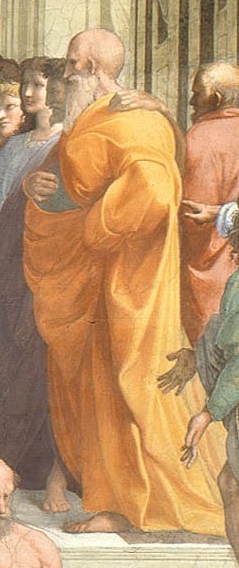Straton of Stageira: Difference between revisions
(Removed non-functioning references) |
m (Fixed links) |
||
| Line 28: | Line 28: | ||
Straton's most famous work came in 260 BCE, with the writing and concept that became know retroactively as the Talos Principle, although Straton never used the term himself. | Straton's most famous work came in 260 BCE, with the writing and concept that became know retroactively as the Talos Principle, although Straton never used the term himself. | ||
In it, Straton recalled the myth of [[Talos| | In it, Straton recalled the myth of [[wikipedia:Talos|Talos]], a bronze, mechanical man made that had a single vein of a liquid that acted like blood. Though the details of the myth varied, all variations noted that the human-like Talos, once he lost his "blood", died like any other man. Straton thus points out that, if much of Talos' body and mechanisms acted the same as human, then humans themselves could be considered machines. He regards this fact as unassailable, and in defiance of most known metaphysics, making the point that, regardless of any philosophy on the nature of reality, that "even the most faithful philosopher cannot live without his blood." | ||
The most common and original interpretation on the Talos Principle focused on the point that if men lose their blood. It became an empirical argument as a point that could not be denied about the physical world. The concept angered many of his peers and later philosophers, who found no way around the point despite their own assertions about reality. According to one writer, the principle "cut through their rhetorical webs, which sought to tangle the listener with fanciful words and thoughts of the heavens, like Alexander's sword through the Gordian Knot." | The most common and original interpretation on the Talos Principle focused on the point that if men lose their blood. It became an empirical argument as a point that could not be denied about the physical world. The concept angered many of his peers and later philosophers, who found no way around the point despite their own assertions about reality. According to one writer, the principle "cut through their rhetorical webs, which sought to tangle the listener with fanciful words and thoughts of the heavens, like Alexander's sword through the Gordian Knot." | ||
| Line 85: | Line 85: | ||
== References == | == References == | ||
* [ | * [https://www.youtube.com/watch?v=4R4Q31e0YIc The Talos Principle (documentary)] | ||
* [[Talos principle.txt]] | * [[Talos principle.txt]] | ||
* [[Beginnings.txt]] | * [[Beginnings.txt]] | ||
* [[Straton of stageira.wiki]] | * [[Straton of stageira.wiki]] | ||
* [[A simple principle.html]] | |||
* Straton of Stageira (blog) | * Straton of Stageira (blog) | ||
** [https://stratonofstageira.wordpress.com/2013/04/30/respect/ "Respect"] | |||
** [ | ** [https://stratonofstageira.wordpress.com/2012/08/01/review-the-talos-principle-penguin-books/ "Review: The Talos Principle (Penguin Books)"] | ||
** [ | ** [https://stratonofstageira.wordpress.com/2013/06/01/review-the-talos-principle-wordsworth-classics/ "Review: The Talos Principle (Wordsworth Classics)"] | ||
[[Category:Characters]] | [[Category:Characters]] | ||
[[Category:TTP2]] | [[Category:TTP2]] | ||
[[Category:TTP1]] | [[Category:TTP1]] | ||
Revision as of 02:00, 1 February 2024
| Straton of Stageira | |
|---|---|
| Species: | Ancient Human |
| Affiliations: | Philosopher |
| Status: | Deceased |
| Voice actor: | Howard Ward |
Straton of Stageira (c. 311-254 BCE) is a fictional Greek philosopher. He lived in Athens and was an admirer of Aristotle. He is the creator of the idea of the Talos Principle.
Biography
Straton was born around 311 BCE in the ancient Greek town of Stageira on the Chalkidiki peninsula, during the Hellenistic Greek period.
Little is known about his early life, or personal life later on. However, he was said to have travelled far distances during his life, observing many peoples and customs. This led him to recognize traits and aspects universal to all humans, including bleeding and death, which likely informed his later views on humanity.

In Athens and much of ancient Greece, Straton became infamous for his sharp positions and strongly-pointed rhetoric, debating those whose philosophies he felt derived purely from ideas rather than fact, which caused many of his peers to loathe him. He was even strongly critical of Aristotle (Also born in Stageira) in his writings, although he also held great respect for the man.
Straton would die in 254 BCE, the cause of his death unknown.
Philosophies
Straton was a proponent of empirical knowledge in finding truth. He regarded many of the philosophies of his contemporaries to be based on a false premise, saying that "they begin not with observation of the cosmos as it surrounds us, but with a conclusion already in mind." The concept of truth and reasoning was frequently key in many of his writings, alongside more broad concepts on the nature of man in the universe.
The Talos Principle (Concept)
Straton's most famous work came in 260 BCE, with the writing and concept that became know retroactively as the Talos Principle, although Straton never used the term himself.
In it, Straton recalled the myth of Talos, a bronze, mechanical man made that had a single vein of a liquid that acted like blood. Though the details of the myth varied, all variations noted that the human-like Talos, once he lost his "blood", died like any other man. Straton thus points out that, if much of Talos' body and mechanisms acted the same as human, then humans themselves could be considered machines. He regards this fact as unassailable, and in defiance of most known metaphysics, making the point that, regardless of any philosophy on the nature of reality, that "even the most faithful philosopher cannot live without his blood."
The most common and original interpretation on the Talos Principle focused on the point that if men lose their blood. It became an empirical argument as a point that could not be denied about the physical world. The concept angered many of his peers and later philosophers, who found no way around the point despite their own assertions about reality. According to one writer, the principle "cut through their rhetorical webs, which sought to tangle the listener with fanciful words and thoughts of the heavens, like Alexander's sword through the Gordian Knot."
The principle also puts forth the concept of man as machine long before the modern age and concepts of AI.
Legacy
Following his death, Straton largely fell out of favor with many philosophers, possibly due to having become so disliked by many, and was relatively forgotten. Straton's writings on Aristotle would remain popular, however, while the Talos Principle would also be referenced. Diogenes Laertius purportedly wrote that Anaximander of Chalcedon had a dialogue which "expanded greatly on the Talos Principle," but which became lost by the modern day.
Many copies of his work were said to have been lost during the destruction of the Library of Alexndria, possibly contributing to his relative obscurity. Michelangelo would depict him among other philosophers in his "School of Athens" mural.
In the 20th and 21st centuries, Straton's work would be republished, often collecting numerous pieces of his work and putting them under the name "The Talos Principle", with additional essays and introductions. In 1979, a documentary about the life and philosophies of Straton was produced by Oxyrhynchus Documentaries Ltd.
Extended Lifespan Project
Role in the Games
The Talos Principle
The Talos Principle 2

Audio logs
- Main article: Straton's audio logs
There are twelve audio logs in unmarked locations, one per main area of the game. You acquire them by touching what appears to be a hologram of Straton, sitting and in a pensive pose. At that point the figure of Straton disappears and you will hear one of the audio logs. They can later be heard again from the PDA Interface. They are unlocked in sequence, there is no correspondence between an area and a specific log.
- Grasslands Ring
- Wooded Plateau
- Eastern Wetlands
- Desolate Island
- Flooded Valley
- Lost Marshes
- Southern Coast
- Verdant Canyon
- Circular Oasis
- Western Delta
- Anthropic Hills
- High Plain
Research entries
TalosPrinciple2a (Megastructure - HAR-1)
Notable works
- The Talos Principle (Retrieved from a fragment found in Miletus)
- On Beginnings (Found only in fragments)
- On the Universe (There are two versions: the Heraklion manuscript and the Trebizond manuscript)
- The Origins of Thought (Heraklion manuscript)
